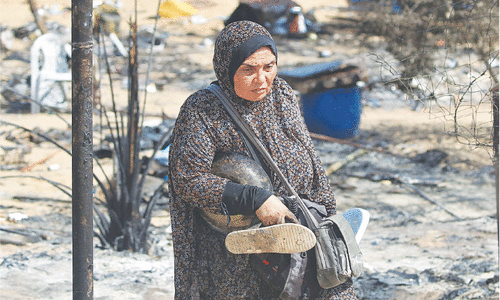MOUNT ARAFAT: The annual hajj pilgrimage started in earnest Wednesday, with more than two million Muslims thronging roads on foot and by bus for a five-day journey of faith most have spent their entire lives waiting for.
The pilgrims, among them more than 1.75 million people who have travelled from across the world to be in Saudi Arabia for the rituals, left the holy city of Mecca at dawn and headed for the sites of Mina, Muzdalifah and Arafat.
In the arid valley of Mina, a pit-stop en route to Mount Arafat, pilgrims will spend Wednesday night in government provided tents and buildings, passing the time in prayer and reflection.
The passage to Mina marks the official launch of the hajj on the eighth day of the Muslim calendar month of Dhul Hijja.
The day is known as Tarwiah (Watering) as pilgrims in the past stopped at Mina to feed their animals and stock up for the following day's trip to Mount Arafat.
But many pilgrims also headed directly to Arafat by late Wednesday.
Unauthorised domestic pilgrims were seen being dropped by cars and infiltrating tight security checkpoints on the roads leading to the Arafat plain.
Men dressed in the white shrouds symbolising resurrection chanted in unison as they marched to Mina: “I am responding to your call, God.”The women, dressed from head to foot revealing only their faces and hands, echoed the religious chant.
Sweaty and exasperated, 55-year-old Indonesian pilgrim Laila Soharti said she was “trying to get to Mina before the roads start getting too crowded.”
”We are thrilled to be heading towards God's most sacred spots on earth,” she told AFP.
In Mina, the desolate plain that only comes to life during the five days of hajj, men and women separate for the night, sharing tents with fellow pilgrims of the same sex.
For Akram Hussein, a 42-year-old Iraqi on his first pilgrimage with his family described the hajj as “great days in which we must follow in the footsteps of our Prophet Mohammed.”
'God has chosen us'
Syrian pilgrim Mohammed Noor meanwhile said he was “extremely glad God has chosen us from among so many people to perform hajj this year and we hope he will also aid us in observing the rites correctly.”
”If he chooses that we die here we will be very happy as well since it means we'll go to heaven,” he told AFP soon after arriving in Mina.
The pilgrims' stay in Mecca has so far been incident-free, with some 25,700 members of civil defence deployed throughout the kingdom's holy cities.
In Mina, 100 civil defence teams are on call, ready to deal with emergencies.
Interior ministry spokesman Mansur al-Turki said about 85 percent of the pilgrims will head to Mina while the rest will head straight to Mount Arafat.
The pilgrims will mostly walk or catch a bus for the journey, though about a quarter of the faithful will travel on the Mashair Railway.
More than 18,500 buses will also be used to carry pilgrims, while vehicles carrying less than 25 people will not be allowed access into the three holy sites.
On Wednesday, pilgrims were seen scrambling for a seat on the buses, with some deciding to risk riding on roofs to ensure they don't get left behind.
Thursday, Arafat Day, is the climax of the hajj, when pilgrims ascend Mount Arafat, some 10 kilometres (six miles) southeast of Mina, to spend the day in prayer.
The hilltop and the surrounding plain is where the Prophet Mohammed (PBUH) is believed to have delivered his final hajj sermon before his death.
After sunset, the pilgrims head to Muzdalifah, between Mina and Arafat, where they collect stones to throw at the devil, one of the last rituals which takes place Friday and marks the first day of Eid al-Adha, the feast of sacrifice.
The symbolic “stoning of the devil” is followed by the ritual sacrifice of an animal, usually a lamb.
During the remaining three days of the hajj, the pilgrims continue the stoning ritual before performing the circumambulation of the Kaaba shrine in Mecca and heading home.
The hajj is one of the five pillars of Islam that every capable Muslim must perform at least once.
Despite being marred by deadly incidents in the past, including floods, stampedes and fires, the hajj has passed nearly incident-free in recent years, thanks to multi-billion-dollar projects being implemented every year.
This year alone, the kingdom spent more than 1.1 billion riyals ($293.3 million) on development projects in Mina, Arafat, and Muzdalifah, all outside Mecca.















































Dear visitor, the comments section is undergoing an overhaul and will return soon.